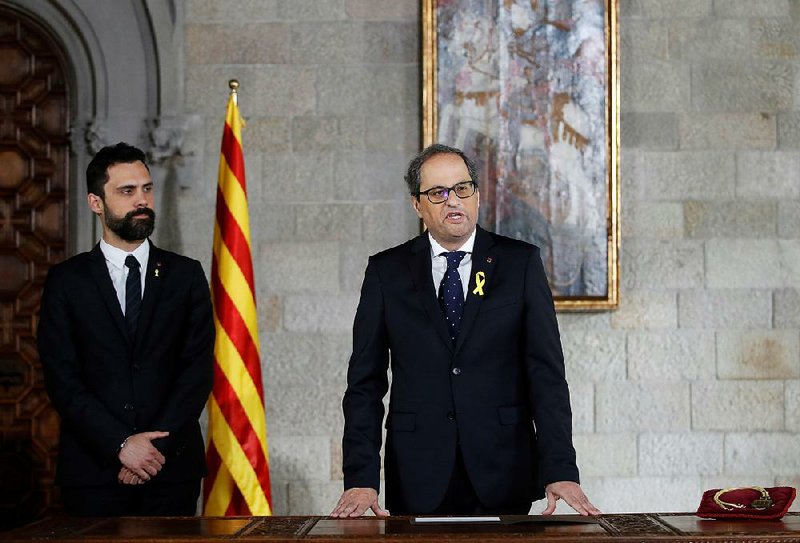Separatist takes helm in tense Catalonia
MADRID — Catalan secessionist Quim Torra was sworn in Thursday as the restive Spanish region’s new leader, with his demands for an independent Catalonia set to prolong a standoff with Spain’s national government.
Torra formally took office at a ceremony in the Catalan capital, Barcelona. He was elected Monday by the Catalan parliament’s secessionist lawmakers.
In a sign of the simmering tension, Spain’s national government in Madrid, which usually sends a representative to regional government ceremonies, declined to attend the swearing-in. It said Catalan authorities had tried to dictate which central government officials could be present — a condition that Madrid rejected.
The dispute over Catalonia’s future has resulted in Spain’s worst political crisis in decades, though its three main political parties stand united against Catalan independence.
Thursday’s ceremony was heavy on symbolism, with pointed signals apparently aimed at the central Spanish authorities. For example, only the red-and-yellow Catalan flag stood behind Torra during the ceremony. The Spanish flag was absent.
Wanted militant slain in Pakistan raid
QUETTA, Pakistan — Pakistani troops raided a militant hideout near the southwestern city of Quetta, triggering a shootout in which a militant wanted in the killing of more than 100 Shiites was gunned down, officials said Thursday.
The military said Salman Badeni, a provincial commander of the sectarian Lashkar-e-Jhangvi group, was killed in Wednesday’s raid in the village of Killi Almas, in Baluchistan province, along with two other militants.
It said Suhail Abid, a senior officer from military intelligence, was “martyred” during the firefight.
On Thursday, militants attacked a security post in Quetta, according to the military, which said five militants were killed and four troops were wounded.
Sunni extremists have regularly targeted the country’s Shiite minority, killing thousands of people in recent years. In Quetta, a series of shootings in recent weeks led activists to demand the military step up security.
Brazil child-porn sweep nets 251 arrests
SAO PAULO — Brazilian police arrested more than 250 people Thursday as they carried out hundreds of searches for child pornography in the largest operation of its kind in the Latin American country.
Thousands of police fanned out in 24 states and the federal district to serve more than 500 warrants, the public-security ministry said. During the searches, police detained people they said were in possession of or were distributing child pornography. By the evening, 251 people had been taken into custody.
Raul Jungmann, head of the security ministry, said the operation was the largest involving civil police in Brazil’s history.
“This is without a doubt one of the most reprehensible, one of the most intolerable crimes against our children and adolescents,” he said at a news conference.
Investigators analyzed more than 1 million files in order to identify the targets of Thursday’s operation, Jungmann said. Last year, American authorities shared with Brazilian investigators tools and methods for identifying such files online, according to Carlos Afonso Goncalves, the director of intelligence at the National Secretariat of Public Security.
Forcibly sterilized, 3 Japanese file suits
TOKYO — Three Japanese who were forcibly sterilized under a government policy decades ago filed lawsuits Thursday demanding an apology and compensation, in a growing movement seeking official redress.
The two men and a woman, all in their 70s, are among at least 16,500 people who were sterilized without consent under the 1948 Eugenics Protection Law that was in place until 1996.
The law, designed to “prevent the birth of poor-quality descendants,” allowed doctors to perform abortions or sterilize people with disabilities.
The three plaintiffs filed their cases Thursday at district courts in Tokyo and the northern cities of Sendai and Sapporo.
Their lawyers say the government’s implementation of the law violated the victims’ right to self-determination, reproductive health and equality.
The government has maintained that the sterilizations were legal. Chief Cabinet Secretary Yoshihide Suga declined to comment Thursday on the lawsuits.
But recent efforts by human-rights groups and lawyers have uncovered evidence including medical records of the victims, prompting the health ministry to investigate for the first time.
A group of lawmakers is working on possible relief measures.
